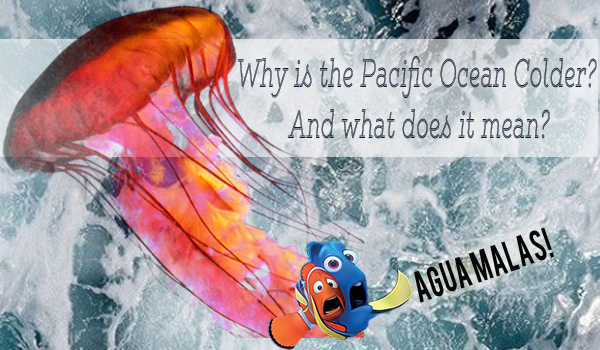Why is the Pacific Ocean Colder? And what does it mean?

The answer is upwelling. What is upwelling you ask? Upwelling is the movement of surface water due to northern winds and the resulting rise of cold, deep, nutrient rich waters. The process of upwelling occurs on the Eastern side of all major oceans. Throughout dry season (Jan – April) the Pacific Coast, particularly the Bay of Panama, becomes the regional center of upwelling. The change in season brings with it a shift from warm, low salinity, nutrient-poor water to cold, high salinity, nutrient-rich water. Not only does upwelling mean colder water for the Pacific coast, it also means a shift in the aquatic ecosystem. Factors including a decrease in temperature, a rise in salinity and food abundance can be associated with increased productivity throughout the summer on the Pacific coast of Panama. (Journal of Plankton Research, 2008)
One benefit of this increase in productivity is that it offers the opportunity to dive and snorkel with large migratory fish. With cooler water rich with plankton, areas like Coiba, see an increase in large fish including whale sharks and manta rays. Dry season is also the time of year that the visibility is best, reaching 30 meters or more. Migratory fish like tunas and amber jacks are also abundant off the Pacific coast in areas like Santa Catalina and Pedasi. So weather is it fishing, snorkeling or diving you enjoy, now is the time!
Nutrient rich, high salinity water is also a favorable environment for jellyfish. For this reason throughout the summer months we see “blooms” or days with an extraordinary abundance of jellyfish on the coast. There is no evidence indicating what specific factor of upwelling is responsible. Scientists believe it is probably a combination of a few.
Factors influencing an increase in Jellyfish through the dry season may include the abundance of food available, the overfishing of their predators and the rise in salinity. With plankton in abundance and fewer predators (tuna, sharks and sea turtles) jellyfish have an easier time floating about. Another factor could be salty waters; saltier waters contain iodine, which is necessary for polyps (baby jellies) to become jellyfish.
So, while upwelling brings a better fishing, diving and snorkeling experience, take precautions against jellyfish stings by wearing a wet suit in the water, and carrying vinegar to neutralize stings.
Trending Tags
